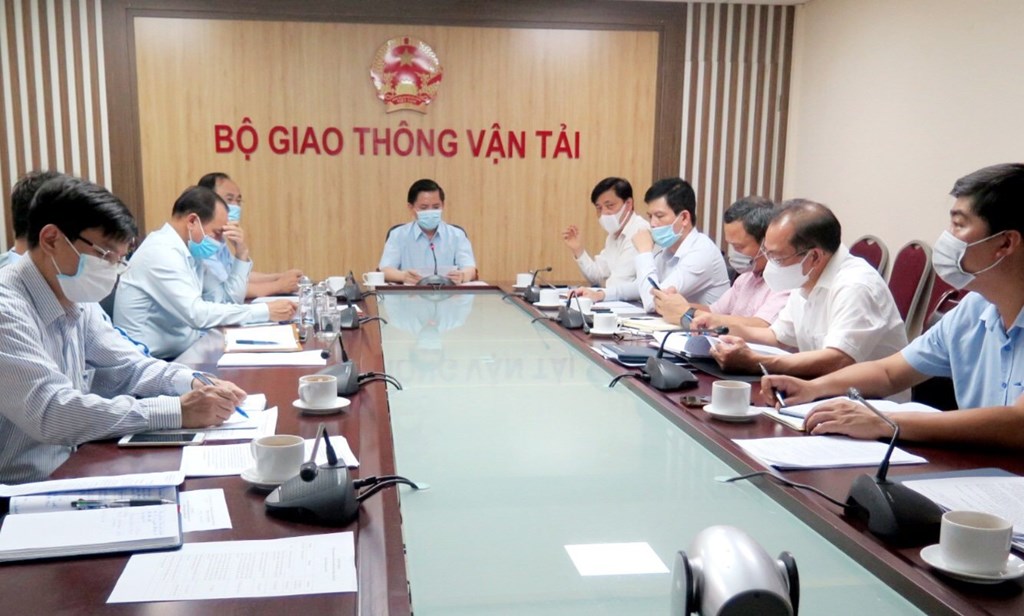Code of conduct and communication in performing duties of official holders under the Ministry of Transport in Vietnam
What are the regulations on the code of conduct and communication in performing duties of official holders under the Ministry of Transport in Vietnam? – Thanh Phuong (Khanh Hoa)

Code of conduct and communication in performing duties of official holders under the Ministry of Transport in Vietnam (Internet image)
1. Code of conduct and communication in performing duties of official holders under the Ministry of Transport in Vietnam
- Code of conduct and communication in dealing with the requirements of organizations and citizens:
+ When communicating with organizations and citizens to receive or handle administrative procedures, complaints, and recommendations, persons with positions and powers must respect, listen, and wholeheartedly explain questions, reflections, and recommendations. Do "4 xin (please), 4 luôn (always)": hello, sorry, thank you, please; Always smiling, always gentle, always listening, always helping.
+ Persons with positions and powers assigned to receive citizens must seriously respect and listen to the opinions of organizations and citizens in order to guide and deal thoroughly and in accordance with the law.
+ Publicly guiding the process of performing professional tasks and administrative procedures approved by competent authorities, ensuring that the proposals and recommendations of organizations and citizens are handled in accordance with law.
+ Not having a bossy attitude, threatening, causing stress, difficulty, trouble, asking for help, or prolonging the processing time of the work of organizations and citizens; not being indifferent, insensitive, or irresponsible to the difficulties and pressing concerns of organizations and citizens. It is strictly forbidden to take advantage of their duties and positions for harassment, trouble, or profiteering.
+ Not refusing to deal with lawful requests of organizations and citizens under their assigned responsibilities and tasks without legitimate reasons; must not lose, damage, or falsify relevant records and documents. In the event that the processing dossier contains errors or delays, the apology must be strictly carried out in accordance with regulations.
+ Not giving advice to other domestic and foreign enterprises, organizations, and individuals on jobs related to state secrets, work secrets, and jobs falling under their jurisdiction or participating in settlement.
- Code of conduct and communication for people in positions, leaders, and managers:
+ Leading by example in all aspects; construction, organization, and working environment of agencies and units must be professional and friendly.
+ Maintaining internal unity; implementing democracy at the grassroots; respecting, listening to, and absorbing the correct opinions of officials, public servants, public employees, and employees; acting according to the principles of democracy, objectivity, fairness, and transparency; must not be voluntaristic, imposing, conservative, autocratic, authoritarian, or disregarding subordinates; must not punish or take advantage of comments and criticism to damage the reputation of subordinates.
+ Assigning tasks to subordinates clearly and regularly checking and monitoring the implementation; capturing the thoughts and aspirations of civil servants, public employees, and employees to arrange and use to promote the capacity and forte of each individual and in accordance with the development plan of the unit.
+ Fairness and objectivity in the management, use, and evaluation of civil servants, public employees, and employees under their management; take the initiative to resign from his position when he realizes that he is still limited in capacity and prestige.
+ Not taking advantage of positions, powers, or impersonation to create prestige when participating in activities in society; not to use public properties and means for social activities that are not part of their official duties and activities; not to organize weddings, funerals, birthdays, housewarmings, promotions, and other activities for themselves and their families for self-seeking purposes.
+ Not establishing or holding managerial or executive positions in private enterprises, limited liability companies, joint-stock companies, partnerships, or cooperatives in the field for which he was previously responsible within a certain period of time as prescribed by the Government.
+ The head and deputy of the head may not appoint his or her spouse, father, mother, child, brother, sister, or younger brother to hold the position of manager in terms of organization, personnel, accounting, or treasurer, storekeepers in agencies, organizations, or units under their management, or trade, purchase, and sell goods and services, or sign contracts for agencies, organizations, or units under their management.
+ Heads and deputy heads of the heads of organizations or units are not allowed to contribute capital to enterprises operating within the scope of industry or trade in which he/she directly performs state management or let his/her spouse, father, mother, or child do business within the lines of business in which such person directly performs state management.
+ Member of the Board of Directors, member of the Members' Council, President of the company, General Director, Deputy General Director, Director, Deputy Director, Chief Accountant and Controllers at enterprises under the management of the Ministry of Transport may not enter into contracts with enterprises owned by spouses, fathers, mothers, children, brothers, sisters and brothers; not allow enterprises owned by spouses, fathers, mothers, children, brothers, sisters and brothers to participate in the bidding packages of their enterprises; not arrange spouses, fathers, mothers, children, brothers, sisters, siblings to hold managerial positions in organization, personnel, accounting, cashiers, storekeepers in enterprises or trade, purchase and sell goods, services, contract signing for businesses.
- Code of conduct and communication for non-leaders and managers:
+ Complying with the administrative hierarchy means complying with the direction, administration, and work assignment of superiors; not dodging or abdicating tasks, and not being flattered to please.
+ In communication and when performing tasks and official duties, subordinates must have a polite and respectful attitude to their superiors; proactively, frankly, and sincerely contribute ideas to their superiors in order to promptly overcome shortcomings, innovate the direction, administration, and construction of agencies and units; and not take advantage of comments and criticism to damage the prestige and honor of their superiors.
+ Taking responsibility before superiors and before the law for the results of the performance of assigned tasks.
- Code of conduct and communication with colleagues:
+ Having a spirit and attitude of cooperation, coordination, and mutual assistance in performing tasks and public duties; non-sectarian, causing internal disunity within agencies and units.
+ Respecting and protecting the honor and reputation of colleagues; open, sincere, friendly; listen and absorb the correct opinions of colleagues and the collective; frankly give suggestions to colleagues in a constructive and objective spirit; not take advantage of comments and criticism to damage the reputation of colleagues.
- Code of conduct and communication by phone, official email, and social networks:
+ When communicating by phone, persons with positions and powers must declare their names, titles, positions, agencies, and units where they work; have a brief exchange, focusing on work content; The volume is just enough to hear, not grumpy or empty, and don't disconnect the phone suddenly.
+ Managing and using official email boxes in accordance with regulations; sending and replying to official emails in a timely and polite manner.
+ Not using social networks to exploit and propagate unverified, one-sided and one-sided information affecting public service activities; do not use or take advantage of social networks to reflect falsely about organizations and individuals, affecting the reputation and image of the unit, the Ministry and the sector.
+ Not using equipment, an office phone, or an official email to deal with personal matters.
(Article 5 of the Code of Conduct for Official Holders issued together with Decision 636/QD-BGTVT by the Ministry of Transport)
2. Uniform and working style of official holders under the Ministry of Transport in Vietnam
- When performing their duties and tasks, people with positions and powers must dress neatly and politely and wear shoes or sandals with back straps. Clothing must be suitable for the nature of the work, the characteristics of the industry, agency, or unit, and fine customs and traditions. For agencies and units that have their own uniforms, they must comply with separate regulations.
- Strictly abiding by regulations on working time and attending meetings; arranging and using time to work scientifically and effectively. During working hours, do not leave the agency, unit, or working position without a legitimate reason or without the consent of the competent authority; do not do personal work, listen to music, play video games, or use personal entertainment devices.
- Having serious posture, manners, and gestures; a welcoming attitude, humility, respect for the communicator; using standard, clear, coherent language.
- Wearing official ID card (or name tag, badge, or title card as prescribed) throughout the working time, on official duty.
- Arranging the workplace in a neat and orderly manner; do not display or store depraved images, cultural content, or documents against the Party and State.
- Smoking in the right place. It is strictly forbidden to use alcoholic beverages right before and during working hours, lunch breaks on working days (except for cases with the consent of the leaders of agencies, units, and enterprises on holidays, Tet, and the reception of diplomatic guests); strictly comply with the "Drink is not driving" rule.
(Article 4 of the Code of Conduct for Official Holders issued together with Decision 636/QD-BGTVT by the Ministry of Transport)
- Key word:
- official holders
- in Vietnam
- Cases of land rent exemption and reduction under the latest regulations in Vietnam
- Economic infrastructure and social infrastructure system in Thu Duc City, Ho Chi Minh City
- Regulations on ordination with foreign elements in religious organizations in Vietnam
- Increase land compensation prices in Vietnam from January 1, 2026
- Determination of land compensation levels for damage during land requisition process in Vietnam
- Who is permitted to purchase social housing according to latest regulations in Vietnam?
-

- Emergency response and search and rescue organizations ...
- 10:29, 11/09/2024
-

- Handling of the acceptance results of ministerial ...
- 09:30, 11/09/2024
-

- Guidance on unexploded ordnance investigation ...
- 18:30, 09/09/2024
-

- Sources of the National database on construction ...
- 16:37, 09/09/2024
-

- General regulations on the implementation of administrative ...
- 11:30, 09/09/2024
-

- Notable new policies of Vietnam effective as of ...
- 16:26, 11/04/2025
-
.Medium.png)
- Notable documents of Vietnam in the previous week ...
- 16:21, 11/04/2025
-
.Medium.png)
- Notable documents of Vietnam in the previous week ...
- 16:11, 02/04/2025
-
.Medium.png)
- Notable new policies of Vietnam to be effective ...
- 16:04, 02/04/2025
-
.Medium.png)
- Notable new policies of Vietnam effective from ...
- 14:51, 21/03/2025

 Article table of contents
Article table of contents
